Book review: To take little children to boarding or not?

What you need to know:
- Byamugisha opens her account with a brief history of boarding school education in Uganda, tracing the role of Christian Missionary groups such as the Church Missionary Society in establishing the earliest schools
By Godwin Toko
EDUCATION
At what age—if ever—is it appropriate for a parent to consider taking their child to a boarding primary school? Getting children to school in time is a major nightmare many urban parents wake up to on weekdays. To beat the traffic gridlock, some parents are forced to get their children, including those as young as five, out of bed as early as 5 am to hit the road on their way to school.
Over the years, experts have warned of the dangers of inadequate sleep children are receiving, yet many parents are left with no choice but to continue the practice. As an alternative, some parents have opted for boarding schools—Lindzy Byamugisha’s mother being one such parent. At eight, she was driven off to an all girls’ boarding primary school to continue her education.
This book is an account of her time at the said school—which she keeps anonymous—the good, the bad, and the ugly of primary boarding schools to use the words of Sergio Leone.
Byamugisha opens her account with a brief history of boarding school education in Uganda, tracing the role of Christian Missionary groups such as the Church Missionary Society in establishing the earliest schools. She then relates that to how the boarding system has evolved today to the point where some parents take their children as young as five to these school—Out of (their) Sight.
Turning to her own time at the unnamed primary boarding school, Byamugisha writes in great detail about her experience that is, by all accounts, beyond the ordinary. In each chapter, she writes about one aspect of boarding school life that she took time to recall, in great detail.
First, if her mother’s move was intended to save her daughter from the dangers of waking up at 5am, it didn’t. She writes that in the boarding school pupils woke up even earlier—at 4:30am—and while there was no traffic gridlock to run away from, they all had to be in the class by 5:30 am for “morning preps” with the matron’s voice replacing her mother’s. Missing, or turning up late, for the morning preps was tantamount to a major breach of school rules and punished as such.
Byamugisha writes about one experience where she turned late, missed a lesson taught during the morning prep session and was heavily punished by one teacher, Mr Mukasa. Her narration of the punishment will leave readers who care for children’s rights wondering if teachers should be given unchecked powers to punish eight-year-olds as Byamugisha’s teacher exercised that morning on her and others.
Byamugisha’s experience also raises questions on the safety of such young children in boarding schools. She writes about a male non-teaching staff she saw, at least on one occasion, inappropriately touch a female pupil.
Byamugisha’s school held a strict “no grub” policy. She narrates her experience going through school without grub, and the temptation to break this particular rule. On one occasion she did, like many others, and they were caught and punished again. This time though, the punishment wasn’t abusive—each pupil had to eat all she was in possession of.
On the upside, Byamugisha takes her readers through the positives that came with being far away from her parents and the world in a boarding school. As previously stated, Byamugisha was no ordinary school experience. She went for a trip to Japan and another in Rwanda, trips, she writes, were even more enjoyable because they felt like a sort of escape from the confines of boarding school.
An active pupil by all accounts, she once tried her hand in sports, and learnt skills including gardening, and peeling matooke during her time in primary owing to different school policies. She, however, questions some other “skills” they were introduced to such as preparations for sex and marriage offered to them at the paltry age of eleven.
While Byamugisha’s account will make some question whether children so young should be taken to boarding school at all, it quickly becomes obvious that matters were made easier for her by the fact that her mother was supportive and always ready to turn up and help her daughter through her time at the school.
The strong relationship her mother cultivated with teachers also proved very helpful at the school. Perhaps, a major hack for parents who must take their children to boarding schools is: Be around as much as you can.
Byamugisha left her school in 2009, and one would expect that a lot has changed since then. Far from it, she interviewed some that attended the unnamed school in 2018 and their experience is eerily familiar.




